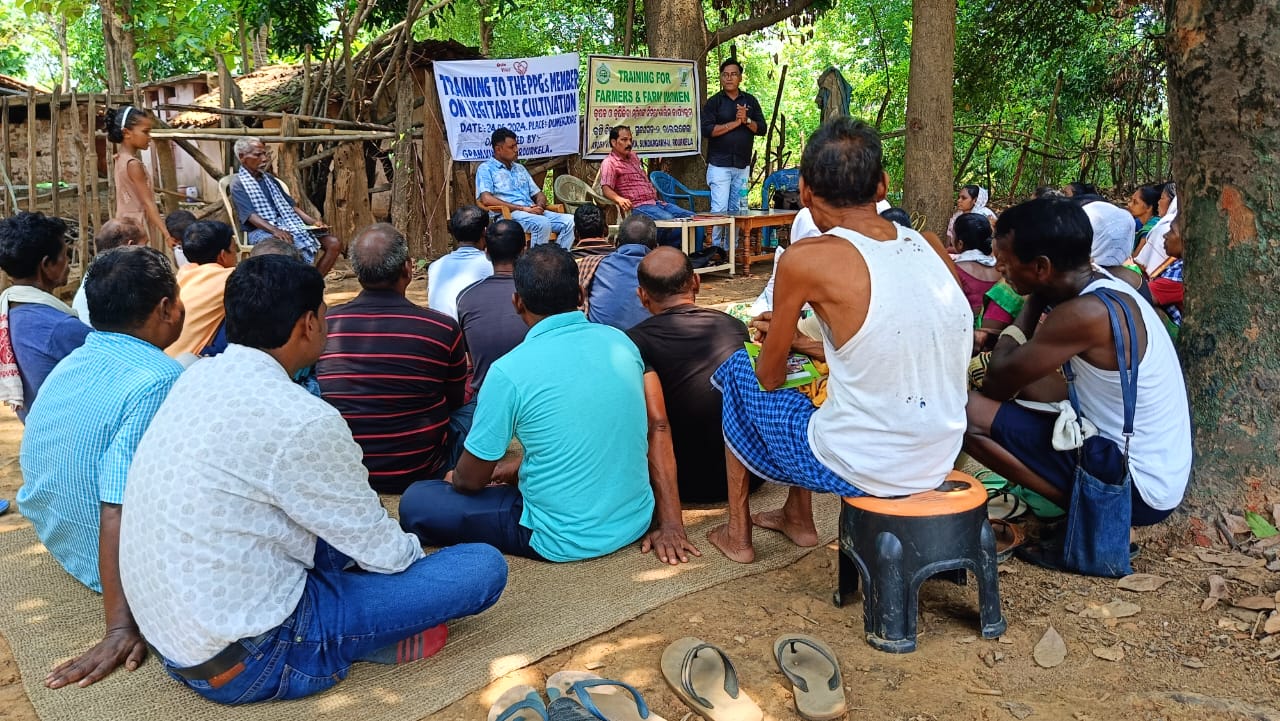Dumerjore’s farmers turn fallow fields into productive farms
StoryBy Shubham Raj and Chandrika Patnaik
13 December 2024
Farmers in Dumerjore, Odisha, transformed their livelihoods by forming a Farmer Producer Group, implementing irrigation solutions, diversifying crops, and planting fruit-bearing trees with Gram Vikas’ support. This ensured year-round farming and sustainable income growth.

A crop-planning session for the farmers in collaboration with the Krishi Vigyan Kendra in Rourkela.
Photograph by Shubham Raj
Manguru Oram, 54, Secretary of the Dumerjore Village Development Committee (VDC) and member of the Jeevan Anand Farmer Producer Group (FPG), reflects on the significant changes in his village. “Having piped water in taps, along with a bathroom and toilet at home, was transformative for us. It changed the way we lived. Gram Vikas continues to mobilise us through health, hygiene, sanitation, and water quality awareness meetings with self help groups, Bal Sabha, and Kishore Kishori Samuh members. In 2022, they brought our community together for community planning to prioritise development and ensure the most vulnerable, like the elderly and widowed, received pensions.”
In mid-2023, Manguru and a few farmers sought Gram Vikas’s support for farming. Dumerjore’s residents, primarily paddy cultivators during the rainy season, left their fields fallow during the dry months due to a lack of irrigation measures.
Empowering farmers through collective action
During the dry months, farmers sell fish caught from the nearby Mandira Dam or work on a daily wage in sponge-iron factories in the Kuarmunda block and in Rourkela city, 18 kilometres away.
Gram Vikas organised a meeting, in June 2023, attended by nearly every household in Dumerjore. Mohan Oram, 28, a farmer and Jeevan Anand FPG member, explains, “With irrigation, we could use our land year-round instead of worrying about earning daily wages elsewhere.” Gram Vikas encouraged farmers to form an FPG, emphasising the benefits of collective bargaining, cost-effective inputs, and better market prices. Inspired by Gram Vikas’s suggestion, the community formed the Jeevan Anand FPG, bringing together 10 farmers who jointly manage 18.5 acres of land.
In collaboration with the Krishi Vigyan Kendra in Rourkela, Gram Vikas organised crop-planning sessions for the group. Two specialists introduced concepts of crop diversity, water budgeting, organic farming, and mixed cropping. Farmers developed plans for Kharif and Rabi seasons, aligning with past agricultural data and weather conditions, aiding diversification of crops to maximise yields.
Innovative solutions for sustainable farming
Recognising the need for sustainable irrigation measures, the FPG submitted a written request to the Lift Irrigation Department in Rourkela for a motor to pump water from Mandira Dam. This initiative and Gram Vikas’s guidance enable farmers to year-round farming, significantly boosting incomes.
Encouraged to diversify income sources, the group decided to plant fruit-bearing trees. Mohan recalls, “Considering market demand, we suggested guava, lemon, and pomegranate saplings.” In September 2024, the FPG planted 1,320 saplings across their land, supported by technical guidance from Gram Vikas. “The plantation will not only improve greenery and soil moisture but also provide us with additional income in the next four years,” says Bandana Oram, a member of the Jeevan Anand FPG, who planted saplings on two acres of her land. In November 2024, the farmers built farm bunds along the edges of their fields covering 1.80 acres to retain rainwater which would help increase soil moisture and prevent soil erosion.
A collaborative effort
The Jeevan Anand FPG is part of a broader initiative led by Gram Vikas in partnership with the Deloitte Foundation. Since October 2022, Gram Vikas has supported 22 FPGs and 445 farmers.
By October 2024, Gram Vikas had facilitated the formation of three more groups, exemplifying how collective action, innovative farming techniques, and sustainable practices are transforming rural livelihoods in Odisha.
Seasonal limitations no longer bind Dumerjore’s farmers. With irrigation, crop diversity, and fruit plantations, they are sowing seeds of resilience and reaping the rewards of unity.
Varieties of fruit-bearing trees saplings ready for plantation.
Photograph by Shubham Raj
ACKNOWLEDGEMENT
Jayanta Podh, Thematic Coordinator in Livelihoods supported with data collection.
ABOUT THE AUTHOR
Shubham Raj, a Thematic Coordinator in Planning Monitoring and Documentation and Communication and Chandrika Patnaik leads content production within the Gram Vikas communications team. Priya Pillai edited the story.
RELATED BLOGPOSTS
Turning losses into gains: How Mallipanka farmers find success in new crops
Reviving agriculture: Mallipanka’s first strawberry farm story.
Ensuring dignity beyond life: supporting migrant families in their darkest hours
Gram Vikas ensures safe migration and dignified repatriation for deceased migrant workers, supporting bereaved families.
Collective leadership transforms ageing overhead water tank to secure household water supply for all
Kalakhadi’s aging overhead tank revived through collective leadership, ensuring sustainable water supply for the community.